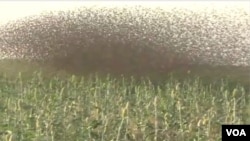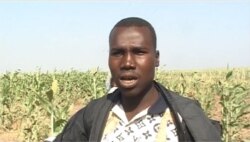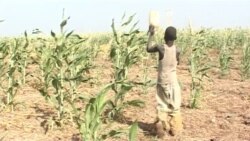Authorities in Cameroon say millions of weaver birds have decimated thousands of hectares of farmland on the northern border with Chad and Nigeria. Farmers say between the birds, elephant attacks and floods, the area is on the verge of famine.
In an effort to scare away the birds, youths assemble in millet farms in the northern town of Waza everyday to beat drums, dishes and pots, says 23-year-old farmer Illiasu Issa. He says schoolchildren are only allowed to return to class when the birds leave.
Issa says everyone must pitch in to scare away the small, dark weaver birds that have already destroyed at least 600 hectares of farmland in and around Waza.
Ibrahim Mohamed, the mayor of Waza, says his council cannot afford to hire aircraft that experts have told him are needed to chase away the giant flocks of birds.
He says all he can do is provide a meal each day for the hundreds of youths struggling to save their farms.
Millet is the main source of livelihood for the close to 50,000 people of Waza district. Mohamed says farmers export the millet to Chad, Nigeria and southern Cameroon industrial towns like Douala and Yaounde.
He says if the government of Cameroon fails to help farmers chase the birds with helicopters and planes, then poverty and famine will strike in the months ahead.
Midjiyawa Bakari, governor of Cameroon’s Far North region where Waza is located, says the weaver birds are one of several factors threatening food safety in northern Cameroon.
Last month, rampaging elephants destroyed maize and sorghum fields and left hundreds of people homeless. In August, the area was hit by floods.
Bakari says people in the area need help. The last time such an attack by weaver birds was reported in northern Cameroon was over 30 years ago, he added.
Bakari has requested help from the central government in Yaounde to protect crops that have not yet been destroyed by the birds.
Waza villagers say after the last weaver bird attack 32 years ago, the government sent food aid which was largely insufficient for their needs. They were also given fertilizers and seeds to plant new crops, but they remained poor until the next millet harvesting season.
In addition to the immediate threat to food safety, Bakari says it is imperative for children who are returning to school after several years of absence due to Boko Haram terrorism not be distracted.








